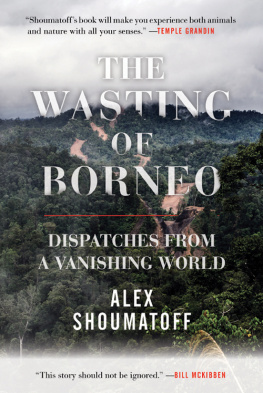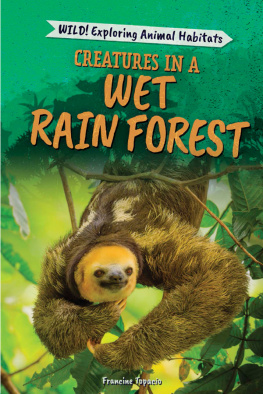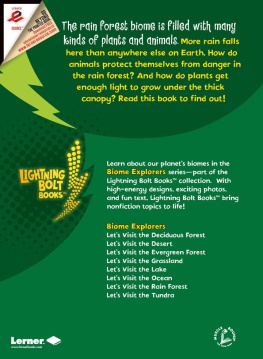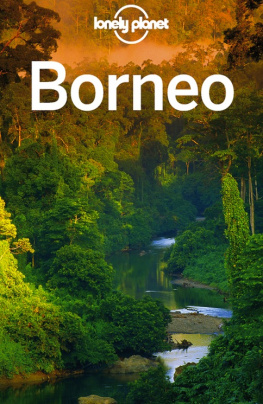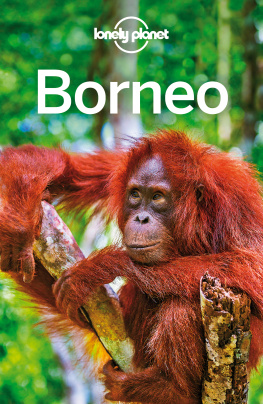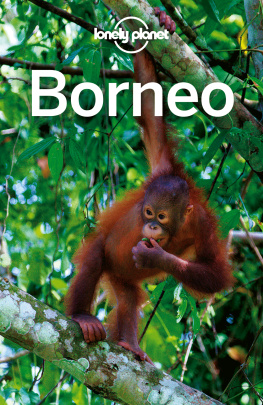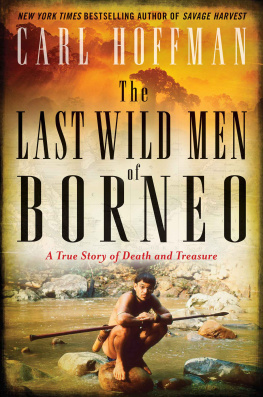ALSO BY ALEX SHOUMATOFF
Legends of the American Desert
The World Is Burning
African Madness
In Southern Light
The Mountain of Names
Russian Blood
The Capital of Hope
Westchester: Portrait of a County
The Rivers Amazon
Florida Ramble

To Birut Mary Galdikas and the
orangutans and the Penan and the other
indigenous people of Borneos rain forest:
May your struggle to save it prevail!

INTRODUCTION
ON THE 19TH OF NOVEMBER, 2013, I flew from Montreal to Dubai, where I had a five-hour layover. The transit area was a fabulous bazaar of diamond-encrusted Rolexes, Gucci, Armani, all the luxury brands. Elegant veiled women with petrodollars to burn were floating around the racks and display cases. From there I flew to Kuala Lumpur and got a shuttle bus to the budget motel where we had agreed to meet. It was a stark, Hopperesque facility where nobody ever stayed for more than a night, four stories of concrete in an ocean of oil-palm trees on the way into the city that twenty-five million souls call home. Your friend is in the courtyard, the man at the front desk told me as he handed me my plastic key, towel, and little bar of soap. I walked out to the courtyard, wondering if I was going to have any trouble recognizing himDavie Holderness, my best childhood buddyafter fifty-five years. I had no idea what he was going to look like. But the courtyard was small and there was only one table, and only one person sitting at it, nursing a beer. A white man of my vintage, the left sleeve of his shirt slack. Davie had told me, when Id finally tracked him down a year ago, in eastern Washington State, how he had lost his left arm fifteen years before when a snowmobile he was traveling on at high speed flipped.
Davie! I cant believe it! I cried to him and he got up and called out, Panda! (my boyhood name, inspired by my high Tatar cheekbones and slightly slanted eyes). We hugged and took a good look at each other. Sixty-seven now, he was really distinguished looking. With his wavy gray hair and a thin mustache on his long patrician face, he bore a striking resemblance to Richard Boone in Have GunWill Travel, the TV western we used to watch religiously. We sat there together, not saying anything, settling into the fact that here we were, together again after all these years. The waiter brought me a beer, and after several minutes a gusher of memories started to pour out.
Memories of Bedford Village, New York, the picturesque old New England community forty miles north of New York City, in the heart of a magnificent hardwood forest, where we had lived until the age of thirteen. The Holdernesses lived across the street, and between the ages of seven and eleven Davie and I had spent all our free time in the woods. We fished every lake, pond, river, and creek in the thirty-nine-square-mile township. Bedford in those days was crawling with frogs, snakes, turtles and in the summer was full of birdsong and the earsplitting drone of cicadas, its meadows blazing with wildflowers and swarming with butterflies. It had a riotous abundance, a fecundity and a profusion of life that has disappeared since then from most of the United States and the world. It was paradise for kids like us.
Then we graduated from eighth grade, Davie in 1959, I a year later, and went off to different boarding schools. My dad got a job in London and we moved there for six years, and by the time I got back to Bedford, at the end of the summer of 1966, Davie had dropped out of Syracuse, and then I heard he went out west and was picking apples in Oregon or maybe Washington, and I completely lost track of him. A few years ago I started wondering where he was and wanting to reconnect with him. He was one of the half-dozen most important people in my life, someone I really loved, and I didnt even know if he was still alive.
Our paths didnt cross again until last summer, when I went out to the Big Island of Hawaii to visit the Mauna Loa Observatory for a story I was doing for Vanity FairI had become a journalist, and Vanity Fair had been my main outlet since 1986investigating the human hand in the extreme weather events that are happening now with increasing regularity, almost every month, somewhere in the world. The observatory has been conducting the longest measurement of atmospheric carbon anywhere, going back to 1959. Its director, John Barnes, explained that when they began, there were 200 ppmparts per millionof carbon in the atmosphere, more than there had been in the last two hundred thousand years. Now there are 315 ppm, and were moving out of the climatic sweet spot that has enabled our species to have had such an astonishing spurt of cultural and technological evolution, starting with the agricultural revolution in Mesopotamia ten thousand years ago. Dr. Barnes showed me how the graphs of global mean temperature (Manns hockey stick) and of atmospheric carbon (the Keeling Curve) both begin to rise in 1750 when the Industrial Revolution gets going, and in 1970 they both shoot up nearly vertically. I have no political stake in this, he assured me. I am a scientist, and the science clearly shows that anthropogenic greenhouse gases are causing this warming spike. There is no other possible explanation.
So its us, I thought as I drove down from Mauna Loa: the burning of fossil fuels since the beginning of the Industrial Revolution. First coal, then, with the invention of the internal combustion engine, oil; our growing numbers; the ongoing assault on the worlds forests, whose trees could have removed some of the carbon we are putting into the air; and what Pope Francis calls amoral consumerism and the perverse relationship between the developed and developing world. What Ive been writing about for forty years, ever since I saw the horrendous fires in the Amazon in 1975.
I stayed with Zoe Thorne, Davies first cousin, who is married to a Hawaiian volcanologist and has been living on the Big Island for years. She said Davie was living in Washington State, and had his number, so I called him and we had a great reunion for an hour or so over the phone and agreed we had to see each other at the earliest opportunity. Maybe you can join me on one of my adventures, I suggested, and Davie said, Id love to, Panda.
That fall I went to Borneo to meet Birut Mary Galdikas and the orangutans she has devoted her life to for a piece about the latest discoveries of cognitive ethologythat animals have much richer mental, emotional, and moral lives than theyve been given credit for. One afternoon we drove for fifty miles past nothing, to our left, but row after row of oil-palm trees going straight to a hazy low blue ridgeline maybe thirty miles in the distance. Fifteen hundred square miles of some of the oldest and most species-rich and spectacular rain forest on Earth had been totally eradicated to make room for one profitable line after another of Elaeis guineensis oil-palm trees, with big clusters of oil-rich nutsflickering past. Dr. Galdikas has hundreds of orangutans in her care center outside the town of Pangkalanbun, confiscated from loggers and pet owners, but there is almost no forest left in central Kalimantan, the southern, Indonesian two-thirds of Borneo, where she can release them. In the late eighties was the most dramatic on Earth, and its still happening. Rain forests one hundred and thirty million years old in places, with insects, plants, and other species that havent even been identified, are going up in smoke. The Wildlife Conservation Society is calling it the greatest destruction of biodiversity on the planet. And almost nobody in the West knows or cares, even though we are all implicated as consumers of hundreds of modern products that contain palm oil. I knew I had to come back and write about this.

